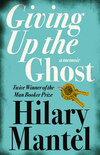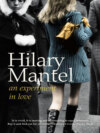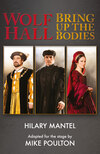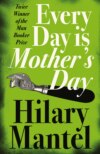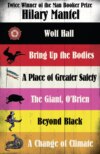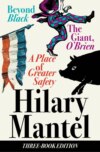Читать книгу: «Giving up the Ghost», страница 2
In the February of 2002, my godmother Maggie fell ill, and hospital visits took me back to my native village. After a short illness she died, at the age of almost ninety-five, and I returned again for her funeral. I had been back many times over the years, but on this occasion there was a particular route I had to take: down the winding road between the hedgerows and the stone wall, and up a wide unmade track which, when I was small, people called ‘the carriage drive’. It leads uphill to the old school, now disused, then to the convent, where there are no nuns these days, then to the church. When I was a child this was my daily walk, once in the morning to school and once again to school after dinner—that meal which the south of England calls lunch. Retracing it as an adult, in my funeral black, I felt a sense of oppression, powerful and familiar. Just before the public road joins the carriage drive came a point where I was overwhelmed by fear and dismay. My eyes moved sideways, in dread, towards dank vegetation, tangled bracken: I wanted to say, stop here, let’s go no further. I remembered how when I was a child, I used to think I might bolt, make a run for it, scurry back to the (comparative) safety of home. The point where fear overcame me was the point of no turning back.
Each month, from the age of seven to my leaving at eleven, we walked in crocodile up the hill from the school to the church to go to confession and be forgiven for our sins. I would come out of church feeling, as you would expect, clean and light. This period of grace never lasted beyond the five minutes it took to get inside the school building. From about the age of four I had begun to believe I had done something wrong. Confession didn’t touch some essential sin. There was something inside me that was beyond remedy and beyond redemption. The school’s work was constant stricture, the systematic crushing of any spontaneity. It enforced rules that had never been articulated, and which changed as soon as you thought you had grasped them. I was conscious, from the first day in the first class, of the need to resist what I found there. When I met my fellow children and heard their yodelling cry—‘Good mo-or-orning, Missis Simpson,’ I thought I had come among lunatics; and the teachers, malign and stupid, seemed to me like the lunatics’ keepers. I knew you must not give in to them. You must not answer questions which evidently had no answer, or which were asked by the keepers simply to amuse themselves and pass the time. You must not accept that things were beyond your understanding because they told you they were; you must go on trying to understand them. A state of inner struggle began. It took a huge expenditure of energy to keep your own thoughts intact. But if you did not make this effort you would be wiped out.
Before I went to school there was a time when I was happy, and I want to write down what I remember about that time. The story of my own childhood is a complicated sentence that I am always trying to finish, to finish and put behind me. It resists finishing, and partly this is because words are not enough; my early world was synaesthesic, and I am haunted by the ghosts of my own sense impressions, which re-emerge when I try to write, and shiver between the lines.
We are taught to be chary of early memories. Sometimes psychologists fake photographs in which a picture of their subject, in his or her childhood, appears in an unfamiliar setting, in places or with people whom in real life they have never seen. The subjects are amazed at first but then—in proportion to their anxiety to please—they oblige by producing a ‘memory’ to cover the experience that they have never actually had. I don’t know what this shows, except that some psychologists have persuasive personalities, that some subjects are imaginative, and that we are all told to trust the evidence of our senses, and we do it: we trust the objective fact of the photograph, not our subjective bewilderment. It’s a trick, it isn’t science; it’s about our present, not about our past. Though my early memories are patchy, I think they are not, or not entirely, a confabulation, and I believe this because of their overwhelming sensory power; they come complete, not like the groping, generalised formulations of the subjects fooled by the photograph. As I say ‘I tasted’, I taste, and as I say ‘I heard’, I hear: I am not talking about a Proustian moment, but a Proustian cine-film. Anyone can run these ancient newsreels, with a bit of preparation, a bit of practice; maybe it comes easier to writers than to many people, but I wouldn’t be sure about that. I wouldn’t agree either that it doesn’t matter what you remember, but only what you think you remember. I have an investment in accuracy; I would never say, ‘It doesn’t matter, it’s history now.’ I know, on the other hand, that a small child has a strange sense of time, where a year seems a decade, and everyone over the age of ten seems grown-up and of an equal age; so although I feel sure of what happened, I am less sure of the sequence and the dateline. I know, too, that once a family has acquired a habit of secrecy, memories begin to distort, because its members confabulate to cover the gaps in the facts; you have to make some sort of sense of what’s going on around you, so you cobble together a narrative as best you can. You add to it, and reason about it, and the distortions breed distortions.
Still, I think people can remember: a face, a perfume: one true thing or two. Doctors used to say babies didn’t feel pain; we know they were wrong. We are born with our sensibilities; perhaps we are conceived that way. Part of our difficulty in trusting ourselves is that in talking of memory we are inclined to use geological metaphors. We talk about buried parts of our past and assume the most distant in time are the hardest to reach: that one has to prospect for them with the help of a hypnotist, or psychotherapist. I don’t think memory is like that: rather that it is like St Augustine’s ‘spreading limitless room’. Or a great plain, a steppe, where all the memories are laid side by side, at the same depth, like seeds under the soil.
There is a colour of paint that doesn’t seem to exist any more, that was a characteristic pigment of my childhood. It is a faded, rain-drenched crimson, like stale and drying blood. You saw it on panelled front doors, and on the frames of sash windows, on mill gates and on those high doorways that led to the ginnels between shops and gave access to their yards. You can still see it, on the more soot-stained and dilapidated old buildings, where the sandblaster hasn’t yet been in to turn the black stone to honey: you can detect a trace of it, a scrape. The restorers of great houses use paint scrapes to identify the original colour scheme of old salons, drawing rooms and staircase halls. I use this paint scrape—oxblood, let’s call it—to refurbish the rooms of my childhood: which were otherwise dark green, and cream, and more lately a cloudy yellow, which hung about at shoulder height, like the aftermath of a fire.
PART TWO Now Geoffrey Don’t Torment Her
Two of my relatives have died by fire. One was my father’s mother, whose name was Alice.
Alice was a widow. She was preparing to marry again, but a short while before the ceremony she saw her dead husband in the street. She took this as a sign to call it off. A house fire killed her before I was born, even before my father married my mother. I’ve never seen her picture. She’s gone.
The other victim of fire was from my mother’s family. She was a little girl called Olive, who was burned to death when her nightdress caught alight. I know her because a photograph of her is set into a brooch. It is oval, which is the shape of melancholy, nostalgia and lost romance. It shows a childlike smudge, unformed, without expression. On the other side of the brooch is George Foster, my maternal grandfather. He is a young soldier, grave, handsome, intent. If you wear the brooch, he is the natural choice to turn outwards. No one, I guess, has ever put Olive on display. She gazes backwards for ever, blurred eyes on someone’s breastbone; looking inside the body, like a child who has never left the womb.
This is the first thing I remember. I am sitting up in my pram. We are outside, in the park called Bankswood. My mother walks backwards. I hold out my arms because I don’t want her to go. She says she’s only going to take my picture. I don’t understand why she goes backwards, back and aslant, tacking to one side. The trees overhead make a noise of urgent conversation, too quick to catch; the leaves part, the sky moves, the sun peers down at me. Away and away she goes, till she comes to a halt. She raises her arm and partly hides her face. The sky and trees rush over my head. I feel dizzied. The entire world is sound, movement. She moves towards me, speaking. The memory ends.
This memory exists now in black and white, because when I was older I saw Bankswood pictures: this photograph or similar ones, perhaps taken that day, perhaps weeks earlier, or weeks later. In the nineteen-fifties photographs often didn’t come out at all, or were so fuzzy that they were thrown away. What remains as a memory, though the colour has bled away, is the fast scudding of clouds and the rush of sound over my head, the wind in the trees: as if the waters of life have begun to flow.
Many years later, when there was a suspicion about my heart, I was sent to hospital for a test called an echocardiogram. A woman rolled me with a big roller. I heard the same sound, the vast, pulsing, universal roar: my own blood in my own veins. But for a time I didn’t know whether that sound came from inside me, or from the depth of the machines by my bed.
I am learning, always learning. To take someone’s picture, you move away from them. When you have finished, you move back.
The results of the test, I should say, were satisfactory. My heart was no bigger than one would expect.
I learn to walk in the house, but don’t remember that. Outside the house, you turn left: I don’t know it’s left. Moving towards the next-door house: from my grandmother (56 Bankbottom, Hadfield, Near Manchester) to her elder sister, at no. 58. Embedded in the stonework on the left of my grandmother’s door is a rusty iron ring. I always slip my finger into it, though I should not. Grandad says it is where they tied the monkey up, but I don’t think they really ever had one; all the same, he lurks in my mind, a small grey monkey with piteous eyes and a long active tail.
I have taken my finger from the ring, and tasted it for metal. I am looking down at the paving stones beneath the window. I have to pass the length of that window before I arrive at no. 58. I keep my eyes on the narrow stones which, placed edge to edge, form a kerb. One, two, and the third is a raised, blueish stone, the colour of a bruise, and on this stone, perhaps because it is the colour of a bruise, I will fall and howl. Because I know I always, always cannot get past; and because howl is my stage of life, it is indulged in me. This goes on, till one day the consciousness of self-fulfilling prophecy enters my head. I decide I will not fall; I will not fall, and see what happens. I negotiate the bruise stone. It is the first time. Only once is needed. Now I can walk outside the house. I jump into the arms of my grandfather, George Foster, and I know I have nothing to fear.
At no. 58 the top of my head comes to the outermost curve of my great-aunt, Annie Connor. Her shape is like the full moon, her smile is beaming; the outer rim of her is covered by her pinny, woven with tiny flowers. It is soft from washing; her hands are hard and chapped; it is barely ten o’clock, and she is getting the cabbage on. ‘Hello, Our Ilary,’ she says; my family have named me aspirationally, but aspiration doesn’t stretch to the ‘H’. Rather embarrassed for her, that she hasn’t spotted who I am, I slip her my name of the day. I claim I’m an Indian brave. I claim I’m Sir Launcelot. I claim I’m the parish priest and she doesn’t quibble. I give her a blessing; she says, thank you Father.
My head comes above the keyboard of the black piano. When you press a key the sound is bronchial, damaged; the piano at no.56 has a more mellow note. I know how to find middle ‘C’ because on the piano at no. 56 this key has a brown stain on the ivory, and a frill chipped out of it, as if some tiny animal has nibbled it. I am fond of the pianos, their two different voices and smells: the deep, disdainful, private aroma of their wood. Nobody has told me yet that I am disastrously unmusical and had better leave the pianos alone. If someone will play I will stand at the side with my fingers on the wood and feel the resonance, the piano breathing and purring like a cat. I do not know a cat. Tibby is Mrs Clayton’s cat. He lives at no. 60, and flees along the wall. I do not know him. He is a Protestant cat. George Clayton is the first in the yard to rise in the morning, winter and summer long before dawn, treading from his house to the lavatory. I see him in the afternoon, coming home in broad day: a bulky figure in blue overalls, with a bulky blinkered head. One day he dies. Mrs Clayton, people say, is ‘taken to Macclesfield’: that is to say, she is mad. When she returns, the cat Tibby still flees along the wall. Instead of George, Mrs Clayton gets a blunt-headed dog called Shula. The dog’s kennel name, she tells me, is Shula Ballerina. It snaps and snarls and hurtles about the backyard. This does not prevent her going mad again.
In no. 58, Annie Connor starts a game. You go into a corner of the room. She into another. You both shout, very loud:
The wind blows east,
The wind blows west,
The wind blows o’er yon cuckoo’s nest.
Where is he
That has to go
Over yonder fields?
Hi Ho!
Then you just run about the room, screaming. So does she.
Two things not to believe: the monkey. People who say, ‘I have eyes in the back of my head.’
I sit on the stairs, which are steep, box-like, dark. I think I am going to die. I have breathed in a housefly, I think I have. The fly was in the room and my mouth open because I was putting into it a sweet. Then the fly was nowhere to be seen. It manifests now as a tickling and scraping on the inside of my throat, the side of my throat that’s nearest to the kitchen wall. I sit with my head down and my arms on my knees. Flies are universally condemned and said to be laden with filth, crawling with germs, therefore what more sure way to die than swallow or inhale one? There is another possibility, which I turn and examine in my brain: perhaps the tickling in my throat is the sweet itself, which is a green sweet from a box of assorted candy called Weekend. Probably I shouldn’t have eaten this one, but a jelly kind or fudge, more suitable to a child, and if I had hesitated and said I want that marzipan someone would have said ‘That’s bad for you,’ but now I’m on the stairs not knowing whether it’s green sweet or fly. The fear of death stirs slowly within my chest cavity, like a stewpot lazily bubbling. I feel sorrow; I am going to miss seeing my grandparents and everyone else I know. I wonder whether I should mention the fact that I am dying, either from a fly or a green sweet. I decide to keep it to myself, as there won’t be anything anyone can do. It will be kinder for them if they don’t know; but I feel lonely, here on the stairs with my future shortening. I curse the moment I opened my mouth, and let the fly in. There is a rasping, tickling sensation deep in my throat, which I think is the fly rubbing its hands together. I begin to wonder how long it will take to die…
After a while I am walking about in the room again. My resolve to die completely alone has faltered. I suppose it will take an hour or so, or I might live till evening. My head is still hanging. What’s the matter? I am asked. I don’t feel I can say. My original intention was not to raise the alarm; also, I feel there is shame in such a death. I would rather just fall over, and that would be an end of it. I feel queasy now. Something is tugging at my attention. Perhaps it is a sense of absurdity. The dry rasping in my throat persists, but now I don’t know if it is the original obstruction lodged there, or the memory of it, the imprint, which is not going to fade from my breathing flesh. For many years the word ‘marzipan’ affects me with its deathly hiss, the buzz in its syllables, a sepulchral fizz.
My grandad goes on to the Red Lamp to take a gill. He puts on his checked sports coat and I shout, ‘Grandad is wearing his beer jacket.’ He puts on his suede shoes and I shout, ‘Grandad has put on his beer shoes.’ He takes up the pitcher from the kitchen shelf and I shout, ‘Grandad is taking his beer jug.’ However mild his habits, however temperate, I can’t be stopped from chronicling his deeds.
The likes of a woman wouldn’t go in the Red Lamp.
My grandfather knows about English things such as Robin Hood. I sit on his knee as he hums ‘All things bright and beautiful’. My grandmother says, ‘George, teaching that child Protestant hymns!’ I dip my finger in his beer to taste it. For high days I have a thimble-sized glass to drink port. My grandmother says,‘George,teaching that child to drink!’ Slowly, slowly, we are pulling away from hearth and home and into the real world. My grandfather is a railway man and has been to Palestine, though not on the train. The spellings he teaches me include trick far-off towns such as Worcester and Gloucester: I cannot write, but no matter. As a grandfather, he knows the wherefores of cotton production, not just the facts of working in the mill. He knows about the American slaves and the Confederacy; also of a giant, name of Gazonka, lives on a hill outside Glossop. Grandad has ancestors, unlike us Irish people, who don’t know our correct birthdays even. One of his ancestors suppressed a riot by laying low a man called Murphy, a thug at the head of a mob who was wielding a wire whip. For this feat, his ancestor was rewarded with the post of sanitary inspector.
From Liverpool he brings jelly animals and a strange kind of balloon with faces and ears, and cardboard feet you can tie on it, to make it stand up. As no one can tell me the name for this item in God’s creation, I name it ‘Fluke’. If you don’t know a word for something, you can just ask me to supply one, but I can’t blow up a balloon; I have not breath. When he’s not on his shift, Grandad’s always at home, he’s always in his parish. My grandmother’s brothers come from Hollingsworth and places even further. They give the impression, to me, of wandering the roads. They turn up unexpectedly; this is the time before telephones, or before anyone went anywhere, to be out when their relatives called. The brothers are indistinguishable elders in many woollen layers, who suck humbugs with loud slurps and sit on hard chairs with their caps still on: on hard chairs set each end of the sideboard, symmetrical, at the back of the room: as if an opera were about to burst out in front of the fireplace. My grandmother serves them a plate of ham and some Cheshire cheese. They cough long and wetly into their balled-up handkerchiefs, and even when they are not crying, their eyes seep.
When my grandmother wants her sister, she bangs on the wall. In other houses ghosts bang but here it’s only Annie Connor, banging back.
The household at 56 Bankbottom lives in co-operation with the household at no. 58. Here lives, besides Annie Connor, her daughter Maggie, who is my godmother and a widow, who has a brown raincoat and a checked woollen scarf. She does errands for people and is at their beck and call. Here lives Beryl, Maggie’s daughter, my heroine: a schoolgirl, dimpled and saucy. There is only one doll for which I ever care, and that one, in tribute to her, is called Beryl. She is a doll made of grubby green satin, with satin stumps for hands and feet, features inked on to a round of calico for her face, and her pointed head of grubby green satin also.
My grandfather has to be knight and commander to all these women. His possessions are a billycan, a notebook and pencil, his guard’s hat and his guard’s lamp. It is my ambition to be a railway guard.
In the desert my grandfather rode a camel. He commanded it with certain words in Egyptian, known only to camels, now imparted to me.
I am three. I sit on my grandmother’s knee eating sponge cake warm from the oven. The cake is pale yellow and so high that I don’t know whether to bite the bottom or the top; from deep experience I understand their different tastes. We are by the fireplace, but the fire is not lit. Sun is shining. Outside the window people pass on the pavement. The back door stands open.
From hooks below the shelf hang two jugs, each of which holds one pint (though not at this moment). One is a rich cream and the other is the palest pink. They curve fatly from their lips, and the light gilds the curve: one a milk skin, one a shell. The table has fat, green, complicated legs. I go under the table to run my fingertip over their convolutions. The table’s top is scrubbed white wood. The knots are like glass. I am comforted to think that next door at no. 58, our dog Rex is under the table, just like me. Peas flick from their pods into a white enamel colander, which has a rim of navy blue. The scent of inner pea pod rises around me. I count the peas. I tug the embryonic peas from the stalk, and count them as half, or quarter. My grandmother makes strawberry pie. A question people pose is, ‘How many beans make five?’
I used to be Irish but I’m not sure now. My grandmother was born on Valentine’s Day, or so she always thought; my mother says that Annie Connor, being the eldest, gave out to her brothers and sisters the birthdays she thought they would like. Now someone has produced an official paper, and Grandma’s birthday’s got altered to the first of March. Everyone laughs at her. She laughs too, but she’s not happy to change. They say she used to be our Valentine, but now she’s a Mad March Hare. Her name is Kitty, sometimes Kate; before she married she was called O’Shea. Her mother—before she married—was called Catherine Ryan. She was a small illiterate lady with an upright walk. An old person who remembers her has told my mother, ‘While you are alive and walking, Catherine Ryan will be alive.’ Or words to that effect.
Much later, when I’m in my teens, my godmother lets it slip that Catherine Ryan was fond of a drink. We have to revise our mental picture of this famous walk of hers, and my mother is no longer so pleased about the comparison. I defend my great-grandmother, saying that I’m not surprised if she took a drink: surely she was like the old woman who lived in a shoe, she had so many children that she didn’t know what to do? Ten, eleven, twelve? I’m always losing count; there’s Paddy and Martin and Daniel and Joe, there’s John and Joanna and Mick. And why did her husband leave her, alone with all those babies? My mother says, it wasn’t his fault; he would have come back to her, Patrick Ryan, if only she had made it possible. My mother is usually on the side of men; I’m, usually, not. Grandma says: one thing about my mammy, anyway, she may have taken a drink but she never smoked a pipe. And oh, she knew how to cook cabbage!
My mother says: ‘Monday’s child is fair of face, Tuesday’s child is full of grace, Wednesday’s child is full of woe, Thursday’s child has far to go, Friday’s child works hard for a living, Saturday’s child is loving and giving, but the child that is born on the Sabbath day, is blithe and bonny, good and gay.’
I have various thoughts about this. I think my mother must be Monday’s child. I know I am born on Sunday but it would be complacent to dwell on it. Besides, I think any parent would prefer Saturday’s child. I ask, which day is my daddy? She doesn’t miss a beat. I think it must be Thursday, she says, because he has to go into town every day.
My father Henry is tall and thin, with a tweed sports jacket. His black hair is slicked back with a patent solution. He wears spectacles and looks very intelligent, in my opinion. He brings home the Manchester Evening News.
When he comes in from work he carries on his coat the complex city smell of smog, ink, tobacco. He has a travelling chess set, its leather cover worn, which folds up and slides into a pocket. The chessmen, red and white, fit into the boards by tiny pegs. I can play with them, but not the proper game. I am not old enough, wait till I am seven. (He might as well say, wait till you’re forty-five, for all that seven means to me.) With his good pen, Henry completes the crossword puzzle in the paper. I sit on his knee while this occurs. To help him, I hold his pen, and click the ballpoint in and out, so it won’t go effete and lazy between clues. I like to get close to people who are thinking, to glue myself to the warm, buzzy, sticky field of their concentration. Henry reads the racing page. It is horses who race. To aid him, I imagine the horses. He says their names. I picture them strenuously.
With my mother and my father Henry I go on the green electric train, the same colour as my raincoat; this coat I have picked specially, as blending in with the electric train; it has an industrial smell of rubber. When we step into the train, with its wide automatic doors, I take the hands of my mother and father and ensure that we all step in together, leading off with the same foot. I am afraid someone will get left behind, and I believe that once the doors have swooped closed you can’t open them again. Suppose one person stepped on first, and the doors closed, and that person was on the train alone, sent ahead: worst of all, suppose that person should be me?
We go to Manchester, to Mrs Ward, my father’s grandmother. (Alice, his mother, has gone up in the fire.) My great-grandfather is still alive and sitting in the back room by the range, but nobody seems to take much notice of him. He has white hair and a black suit and a watch-chain across his meagre belly; I designate him the trade of watchmaker. My Manchester great-grandmother is diminutive even by my standards, with a skull the size of an orange. She takes me upstairs and opens a chest, out of which she takes scraps of shiny, silky fabric. These are to dress my dolls, she explains. I am too polite to say I don’t dress dolls, or sew with stitches.
When my mother sees the scraps, she assumes a look of scorn. Scorn is a beautiful word. He curls his bearded lip in scorn. Bastion is a beautiful world, as is citadel, vaunt and joust. Anyone who hesitates near me, these days, has to read me a chapter of ‘King Arthur and the Knights of the Round Table’. I am considering adding knight errant to the profession of railway guard. Knight errant means knight wanderer, but I also think it means knight who has made a mistake. Mistakes are made all the time; it is a human thing, in a knight, to slip up once in a while.
I am waiting to change into a boy. When I am four this will occur.
I suppose the trips to Manchester occupied a span of years; first the three of us went, then just myself and Henry. I had a dread of the streets and roofscapes, which were like a trap. I was used to looking up and seeing hills. The bay-windowed red-brick houses seemed to me squalid, though they were larger and better appointed than the stone-built millworkers’ cottages in Hadfield. My cousin Geoffrey, a large boy, was told off to take me to the park. It was a gritty walk on the endless pavements, under the second-hand sky, and when you arrived there was only a rabbit of limited interest, twitching its nose through wire. I do not remember Geoffrey’s face at all, only his huge legs in flapping flannel shorts, the blunt bony bulk of his knees. He was my adopted cousin, I was told; I wonder why, out of all the things that weren’t explained, this one thing was explained to me. Back at the house Geoffrey would trap me between items of furniture, sticking out one of those huge legs to prevent me toddling the way I meant to go, then when I turned back barring me with an outstretched arm, so that I revolved about and about in a tearful muddle. He was teasing, he meant me no harm. I saw myself through his eyes, silly, frilly, too tiny to outwit him or hit him, baby fists clenched in exasperation. And this picture dismayed me, so far was it at odds with my own image of myself. In my own mind, I was already at least middle-aged. My judgement of Geoffrey was that only the accident of my small size concealed my great superiority to him in every way. And this made it doubly galling, that I was stuck in an alley between armchairs, and would be rotating there until somebody noticed and said, ‘Now Geoffrey don’t torment her…’
Sitting up at the big table with a white cloth, we ate ham and tongue. The white plates were icy to the touch. Once I asked my mother, why do we always have ham and tongue? She snapped, ‘Because you said you liked it.’ I am amazed; I don’t expect my likes to have any sway in the world, and clearly, neither does she.
The journeys home I don’t remember. I expect I was pole-axed with fatigue, what between Geoffrey and the rabbit and the watchmaker and the strain on my mother’s face. I left us to herd on to the train any way we could.
‘Ward’ means watch, it can be a place of surveillance, it can be the name for a defensible segment within a castle: a place for sentinels.
I have a friend. It is Evelyn, a Protestant. I go down the yard to play with her. Evelyn’s mother is wrapped about and about in a big pinny. She is cheerful and talks in a Scottish way. My mother calls her Kath, which I think a melting name. She teaches me to say Kirkcudbrightshire. When she gives me my dinner she puts the salt already on it: Grandad has noticed that I don’t take salt, but she can’t know that. Her legs in thick dark stockings are the shape of bottles, so when anyone says ‘Stout’ I think of Evelyn’s mum.
Начислим
+22
Покупайте книги и получайте бонусы в Литрес, Читай-городе и Буквоеде.
Участвовать в бонусной программе
